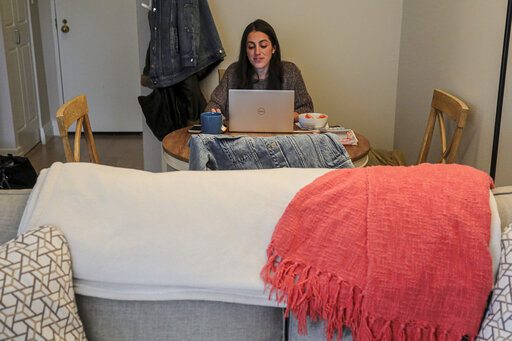The U.S. Labor Department is reminding employers that they must make a reasonable effort to keep track of all hours worked by non-exempt employees — even those working varied hours from home due to the COVID-19 pandemic.
The department’s Wage and Hour Division on Monday issued a bulletin offering guidance regarding employer’s obligations under the Fair Labor Standards Act. The Bureau said it is hoping to clear up any confusion because of the large number of workers who are now telecommuting.
The Labor Department said it last issued interpretive rules on remote work arrangements in 1961.
“Today’s guidance reaffirms that an employer is required to pay its employees for all hours worked, including work not requested but allowed and work performed at home,” the bureau said. “If the employer knows or has reason to believe that an employee is performing work, the time must be counted as hours worked.”
In a blog post, attorney Susan Milner Parrott with the Smith Anderson law firm explained that employers can be responsible for work hours that they become aware of either through “actual knowledge” or “constructive knowledge.”
Employers have actual knowledge when hours are reported on time sheets. Constructive knowledge is trickier. Employers are required to exercise “reasonable diligence,” meaning they may be held responsible for hours that they “should have known” were worked by their employees.
“An employer would be exercising reasonable diligence if the employer established a process by which employees could report unscheduled work time, but the employer should be careful not to discourage, either implicitly or explicitly, the use of such a process,” Parrott wrote.
The guidance also clarifies that employers will not be held responsible for hours worked just because they “could have known,” by checking access to the employer’s computer network or phone calls to supervisors, for example, wrote Taylor Haran of the Faegre Drinker Biddle & Reath law firm.
One important point: “Employers must pay for all hours worked, even if they had a rule against performing the work in the first place,” Haran wrote.
That principle of law was reaffirmed in 2008 by a 2nd Circuit Court of Appeals decision, titled Chao v. Gotham Registry.
Gotham Registry Inc. dispatched nurses to hospitals in need of extra help. After being cited sanctioned by the U.S. Labor Department for failing to pay overtime to registry nurses, the company adopted a policy that prohibited nurses from working more than 40 hours without prior notice. Nurses who did not comply would not be paid for the extra hours worked.
The 2nd Circuit ruled that even if Gotham was not aware of the overtime hours until after the fact, it was still required to pay for the hours worked.
“If Gotham were serious about preventing unauthorized overtime, it could discipline nurses who violate the rule,” the 2nd Circuit Court said. “It could also entirely disavow overtime hours, announcing a policy that it does not, under any circumstances, employ a nurse for more than 40 hours in a week.”
On the other hand, employers aren’t required to conduct a thorough investigation to ensure their employees aren’t failing to report overtime hours. That precedent was affirmed by the 7th Circuit Court of Appeals in a decision titled Allen v. City of Chicago.
Members of the Chicago Police Department’s Bureau of Organized Crime filed suit alleging that they the city did not compensate them for work they did off duty using BlackBerry devices. The officers alleged that the Bureau had an unwritten policy that discouraged them from reporting time that was spent working on the mobile devices, although they had not been specifically ordered not to add that time to the time slips they submitted to their supervisors.
However, some of the plaintiffs testified that they did add hours spent doing work to their time slips and were never denied compensation. The time slips did not indicate how the work was done. No one had been reprimanded or disciplined for submitting time slips that included BlackBerry time.
A U.S. District Court judge ruled that the city had done the due diligence required of it and the 7th Circuit Court of Appeals affirmed. The court said while the Bureau could have learned th at its employees were not being compensated for all hours worked by comparing the time slips to call and email records generated by the BlackBerrys, that level of effort is not required by the Fair Labor Standards Act.
“The reasonable diligence standard asks what the employer should have known, not what ‘it could have known,'” the 7th Circuit said, citing a previous ruling.
In its guidance, the Labor Department said the employer bears the burden of preventing work when it is not desired; adopting a rule prohibiting extra work hours is not enough.
Parrott, of Smith Anderson, said employers can exercise reasonable diligence by ensuring there is a process that employees can use to report unscheduled work time, “but the employer should be careful not to discourage, either implicitly or explicitly, the use of such a process.”
Was this article valuable?
Here are more articles you may enjoy.


 US Will Test Infant Formula to See If Botulism Is Wider Risk
US Will Test Infant Formula to See If Botulism Is Wider Risk  FM Using AI to Elevate Claims to Deliver More Than Just Cost Savings
FM Using AI to Elevate Claims to Deliver More Than Just Cost Savings  UBS Top Executives to Appear at Senate Hearing on Credit Suisse Nazi Accounts
UBS Top Executives to Appear at Senate Hearing on Credit Suisse Nazi Accounts  Cape Cod Faces Highest Snow Risk as New Coastal Storm Forms
Cape Cod Faces Highest Snow Risk as New Coastal Storm Forms 